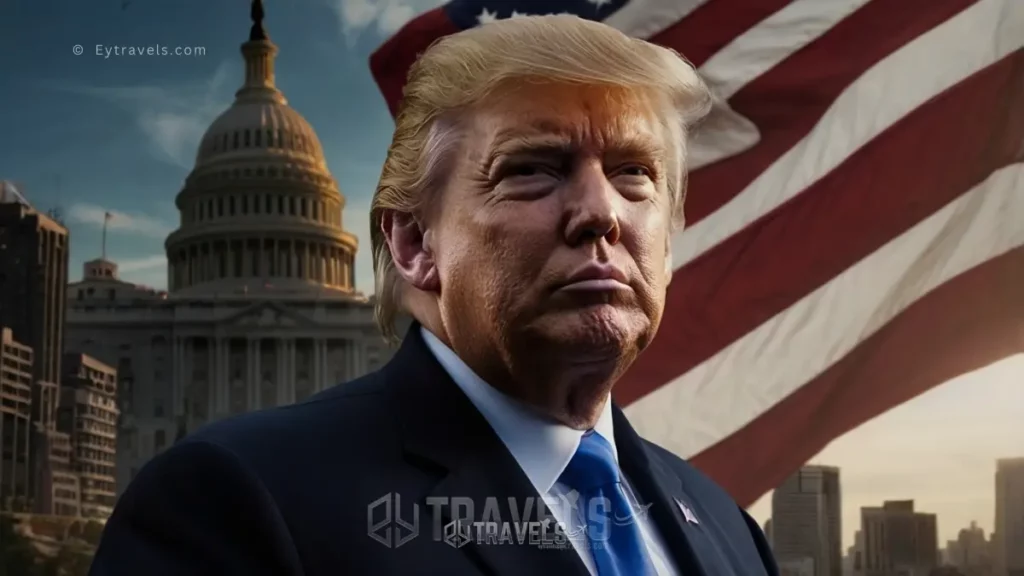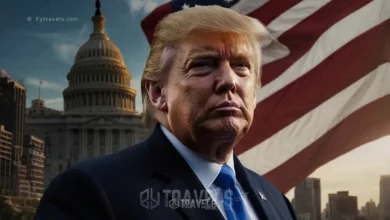Trumpism in Modern Politics: Legacy and Impact
Trumpism in Modern Politics: Legacy and ImpactUnpacking Trumpism: A Comprehensive Analysis of Decade-Long Influence
In the annals of American political history, few figures have left as indelible a mark as Donald Trump. His presidency ushered in an era characterized by a unique blend of populism, nationalism, and protectionism—collectively known as ‘Trumpism.' This political ideology, both revered and reviled, has reverberated across the landscape of modern politics, shaping policies, inciting debates, and fracturing societal norms in its wake.
As we embark on a comprehensive analysis of Trump's decade-long influence, it is imperative to delve beyond mere surface-level observations and dissect the intricate layers of ‘Trumpism' that have seeped into the fabric of American governance.
Trumpism in Modern Politics: Legacy and Impact
The term ‘Trumpism,' coined amidst tumultuous electoral campaigns and fervent rallies that captivated a nation divided, encapsulates not just a surname but an ethos—a political creed that defies conventional categorization. Its implications extend far beyond one man's tenure in office; they probe at the very essence of democracy, power dynamics, and public opinion shaping.

Through examining the evolution of Trumpism—from fiery stump speeches to executive orders etched in policy archives—a nuanced portrayal emerges of a phenomenon that transcends electoral cycles and continues to permeate modern discourse. Thus, our exploration seeks to unravel not just what Trump represented during his time in office but how his legacy persists as an ideological force reshaping contemporary American politics.
Definition and Evolution of Trumpism
Trumpism, as a distinctive political ideology, gained prominence during Donald Trump's election campaigns in 2016 and 2020. It is characterized by a blend of populism, nationalism, and protectionist policies that resonated with a significant portion of the American electorate. This ideology appealed to working-class voters disillusioned with traditional politics and drawn to Trump's unorthodox style and promises of economic revitalization. The evolution of Trumpism can be observed from its roots in campaign rhetoric to its manifestation in policy decisions during the former president's tenure. Over time, Trumpism transformed from mere rhetoric into tangible governance practices, shaping legislative agendas and executive actions.
Populism lies at the core of Trumpism, emphasizing the championing of the common people against perceived elites and establishment figures. Through his rallies and speeches, Donald Trump tapped into populist sentiments by presenting himself as a political outsider fighting for the interests of ordinary Americans. Nationalism also played a pivotal role in Trumpism, with an emphasis on prioritizing national interests over global alliances or commitments.
This nationalist stance was visible in policies such as renegotiating trade deals to favor American manufacturers and a hardline stance on immigration to protect domestic job opportunities. Furthermore, protectionism formed another key component of Trumpism, advocating for economic policies that shield domestic industries from foreign competition through tariffs and trade restrictions.
The evolution of Trumpism beyond electoral campaigns into actual governance involved translating these pillars—populism, nationalism, and protectionism—into concrete policy initiatives. For instance, President Trump's “America First” approach guided decisions on trade agreements like the United States-Mexico-Canada Agreement (USMCA) aimed at bolstering domestic manufacturing sectors.
His administration's immigration policies reflected nationalist sentiments by focusing on border security measures to deter illegal immigration. The notion of protecting American jobs featured prominently with efforts to renegotiate international trade pacts such as NAFTA under the banner of fostering domestic employment opportunities—a hallmark aspect of Trumpist policymaking that distinguish it within modern American political discourse.
Policy Initiatives under Trump Administration
During Donald Trump's presidency, significant policy changes were introduced that reflected the core tenets of Trumpism. Immigration policies under the Trump administration, such as the travel ban on predominantly Muslim countries and the implementation of stricter border control measures, sparked debates on national security versus humanitarian concerns. These initiatives reshaped immigration discourse in America and emphasized a nationalist approach to border security. The impact was felt in both governance practices and societal divisions, highlighting the polarizing effect of Trump's stance on immigration.
Trade policies implemented by the Trump administration aimed to prioritize American economic interests through protectionist measures like tariffs on imported goods. The renegotiation of trade agreements like NAFTA (replaced by USMCA) underscored a shift towards an ‘America First’ trade strategy. These actions stirred global trade tensions while resonating with segments of the American population concerned about job loss and trade imbalances. Post-Trump era, discussions continue around the effectiveness of these policies in addressing domestic economic challenges and their alignment with broader international trade norms.
Healthcare reforms pursued under the Trump administration sought to repeal and replace the Affordable Care Act (ACA), commonly known as Obamacare. Changes to healthcare laws affected access to care, insurance premiums, and Medicaid expansion, prompting debates on healthcare affordability and quality. The post-Trump era witnessed attempts to stabilize ACA provisions amidst ongoing partisan divides on healthcare reform approaches. These policy shifts exemplify enduring discussions on balancing public health needs with market-driven healthcare solutions, pointing to underlying philosophical disagreements persisting beyond specific administrations.
Environmental regulations underwent revisions during the Trump presidency with a focus on deregulation and pro-business environmental policies. Rollbacks of Obama-era environmental protections relaxed industry compliance requirements but raised concerns about long-term environmental sustainability. These policy decisions reflect contrasting views on government oversight in protecting natural resources and mitigating climate change impacts. Evaluating the continuity or deviation from these regulatory changes in subsequent administrations serves as a barometer for assessing evolving attitudes towards environmental stewardship within American governance frameworks influenced by ‘Trumpism.
Donald Trump’s international relations stance
In assessing Donald Trump’s international relations stance, one cannot overlook the distinctive ‘America First' doctrine that underpinned his foreign policy approach. By prioritizing American interests above all else, Trump's administration aimed to renegotiate what it perceived as inequitable agreements and emphasize a more assertive engagement with other nations. This doctrine manifested in tangible shifts such as the withdrawal from the Trans-Pacific Partnership (TPP) and Paris Climate Agreement, signaling a departure from multilateralism towards a more unilateral posture. The imposition of tariffs on trade partners like China in pursuit of better terms for the U.S. economy showcased this nationalist sentiment.
The implications of Trump's foreign policy decisions reverberated throughout global alliances and agreements, leading to tensions with traditional allies like Europe while forging closer ties with autocratic leaders in countries like North Korea and Russia. The unpredictability of diplomatic relations during his tenure created an atmosphere of uncertainty within international circles, challenging established norms of diplomacy and cooperation. Furthermore, his confrontational approach to addressing issues such as NATO funding highlighted a shift towards transactional diplomacy over long-term strategic partnerships.
The lasting impact of Trump's foreign policy decisions on US standing in the global arena remains subject to scrutiny and ongoing evaluation. While some argue that his unorthodox methods brought about necessary recalibrations in international relations dynamics, others point to the erosion of trust among allies and diminished U.S. leadership on global challenges like climate change or arms control. Understanding how these policies continue to shape perceptions of American power on the world stage is crucial for comprehending the enduring influence of ‘Trumpism’ beyond domestic politics into broader geopolitical realms.
Cultural Impact Post-Presidency
In the aftermath of Donald Trump's presidency, his influence on cultural dynamics, public sentiment, and media landscapes has been profound. Trump's unorthodox approach to governance, combative rhetoric, and reliance on social media platforms have significantly shaped cultural movements in the United States. The normalization of certain behaviors and discourses during his tenure has continued to resonate post-presidency, manifesting in heightened political polarization and societal divisions. For instance, the increased visibility of nationalist sentiments and xenophobic attitudes in public discourse can be traced back to Trump's presidency, where such ideologies found a platform for expression.
Social media played a pivotal role in perpetuating ‘Trumpism' beyond the confines of his presidency. Platforms like Twitter became direct avenues for Trump to communicate with his base and amplify his messages, often bypassing traditional media channels. This direct communication style, characterized by impulsivity and controversy, not only energized his supporters but also stoked tensions within society at large. The culture of online echo chambers and the spread of misinformation further entrenched societal divisions along ideological lines long after Trump left office.
The societal impact of Trump's rhetoric extends beyond mere political disagreements; it has seeped into fundamental debates about identity, representation, and national values that underpin future governance strategies in America. The legacy of heightened animosity between opposing factions in American society serves as a lasting reminder of how leadership styles and narratives can leave indelible marks on cultural norms and public opinion. Understanding these cultural reverberations is crucial for shaping strategies that bridge divides and promote unity in an increasingly polarized political landscape post-Trump era.
Influence on Public Discourse
The phenomenon of ‘Trumpism' continues to exert a profound influence on the public discourse surrounding governance, identity politics, and democracy in America. The stark polarization evident in reactions to policies associated with ‘Trumpism' underscores deep-seated societal divisions. Supporters of Trump emphasize his blunt communication style and policy decisions aimed at boosting American jobs and curbing illegal immigration. Conversely, critics argue that Trump's rhetoric often fueled racist sentiments and disregarded traditional diplomatic norms. This clash of perspectives highlights the enduring impact of ‘Trumpism' on shaping how Americans perceive leadership, values, and national priorities.

Analyzing reactions from different sectors of society provides crucial insights into the multifaceted nature of ‘Trumpism's' effects on public discourse. While some segments praise Trump for challenging political correctness and advocating for economic protectionism, others condemn his divisive language and policies as detrimental to social cohesion. These divergent viewpoints underscore the challenge that policymakers face in navigating the complex landscape shaped by Trump's legacy. Delving into various reactions elucidates not only differing interpretations of past events but also forecasts potential ideological clashes likely to persist as ‘Trumpism' remains a potent force in contemporary American politics.
The prevalence of polarized opinions rooted in ‘pro-Trump' versus ‘anti-Trump' stances presents a considerable obstacle to fostering constructive dialogue among citizens and policymakers alike. The binary nature of these perspectives often hampers nuanced discussions about governance issues and impedes efforts toward bipartisan cooperation essential for effective policymaking. By exploring the challenges posed by such entrenched positions, scholars can gain valuable insights into devising strategies to bridge ideological divides and promote a more inclusive public discourse moving forward. Understanding how ‘Trumpism' continues to fuel these polarizations is imperative for comprehensively mapping its lasting impact on American governance structures and democratic principles.
Legacy Assessment: Comparisons with Previous Administrations
In evaluating the legacy of Donald Trump compared to previous administrations, it is essential to recognize the distinctiveness of his impact on American politics. While each president leaves a unique imprint, Trump's unorthodox approach and disruptive policies set him apart. Contrasting his tenure with predecessors reveals shifts in governance dynamics and public discourse that have lingered post-presidency. For instance, Trump's emphasis on executive orders over legislative processes stirred debates about presidential authority and congressional oversight. This contrasts with the more conventional legislative approaches of past administrations, highlighting how Trump altered traditional power dynamics between branches of government.
Examining economic indicators such as GDP growth rates, unemployment levels, and stock market performance during Trump's presidency provides a basis for comparison with earlier administrations. The juxtaposition of these metrics can offer insights into the effectiveness of economic policies pursued by different presidents and their implications for wealth distribution and economic stability. Furthermore, analyzing legislative achievements like tax reforms, healthcare legislation, and infrastructure investments under Trump alongside those of his predecessors elucidates areas where policy priorities diverged or aligned across administrations. Such comparisons shed light on ideological orientations guiding policymaking in distinct eras and their repercussions on societal well-being.
Beyond tangible policy outcomes, assessing broader societal impacts stemming from ‘Trumpism' necessitates exploring shifts in cultural norms, public trust in institutions, and partisan polarization post-Trump era. By delving into social phenomena like the rise of populist movements or the erosion of bipartisan cooperation vis-a-vis historical contexts, scholars can gauge the lasting effects of Trump's rhetoric on societal cohesion. Examining judicial appointments made by Trump alongside predecessors allows for an examination of how ideologically driven court nominations influence legal interpretations and shape societal values over time. These comparative analyses provide a nuanced understanding of ‘Trumpism's' enduring ramifications on American governance structures and civic engagement.
The Phenomenon of ‘Trumpism' Within American Politics
Academic circles have provided a diverse array of critiques and endorsements regarding the phenomenon of ‘Trumpism' within American politics. Scholars from various disciplinary standpoints have engaged in rigorous analysis to dissect the roots of Trumpism and its enduring impact on governance structures. While some scholars argue that Trumpism was a reflection of existing societal fractures, others contend that it tapped into genuine grievances among certain segments of the population, particularly those feeling marginalized by established political norms. This divergence in perspectives highlights the complexity surrounding interpretations of Trumpism's rise and influence.
Moreover, within academic discourse, specific aspects of Trumpism have received both endorsements and criticisms. For instance, the emphasis on economic nationalism and protectionist policies under Trump's administration has been lauded by some economists for prioritizing domestic industries and employment opportunities. Conversely, critics argue that such policies may lead to trade conflicts and disrupt global economic stability. This dichotomy underscores the polarizing nature of policy decisions associated with Trumpism and prompts deeper inquiries into their long-term consequences.
Debates within academia about the factors contributing to the sustained influence of Trumpism over a decade have brought forth nuanced analyses. Some scholars underscore the role of social media in amplifying populist narratives that resonate with certain voter demographics, while others focus on ideological shifts within political parties that paved the way for Trump's ascent. By examining these multifaceted perspectives, scholars aim to unravel the intricate web of influences shaping contemporary American politics and shed light on potential trajectories for future ideological movements in the post-Trump era. The academic community continues to grapple with understanding not only the origins but also the lasting implications of Trumpism on democratic institutions and public discourse as a whole.
Future Implications for American Governance
As we reflect on the lasting influence of ‘Trumpism' within the landscape of American governance, it becomes imperative to extrapolate lessons from this political era to better navigate future strategies. The examination of Donald Trump's presidency through the lens of ‘Trumpism' offers insights into the vulnerabilities and strengths of populist-nationalist movements in democratic systems. By dissecting the policies, rhetoric, and societal repercussions associated with Trumpism, policymakers can anticipate potential challenges in governance structures and proactively design mechanisms to address them.
One potential scenario for continued influence stemming from the analysis of ‘Trumpism' lies in understanding the appeal of simplistic messaging that resonated with a significant portion of the electorate. As seen during Trump's campaigns and presidency, communication strategies that prioritize emotional responses over nuanced policy discussions can sway public opinion significantly. Future governance strategies may need to incorporate effective communication tactics that balance accessibility with accuracy to maintain public trust while addressing complex issues.
Moreover, lessons learned from critiquing aspects like unilateral decision-making and disregard for institutional norms under the Trump administration could inform safeguards against executive overreach in future administrations.
Conversely, mitigation strategies derived from historical analysis might involve bolstering institutions' resilience against populist attacks on democratic norms and delegitimization efforts. Strengthening checks and balances within the three branches of government, enhancing transparency measures, and fostering a culture of accountability could serve as proactive measures against potential erosion of democratic principles under similar ideological movements. By leveraging insights gained from critically assessing ‘Trumpism,' American governance can navigate future challenges by fortifying democratic foundations without compromising legitimate concerns raised by populism regarding elitism and establishment disconnect.
In essence, reflecting on ‘Trumpism' as a case study within contemporary American politics allows for a proactive approach toward shaping future governance frameworks resilient to illiberal tendencies yet receptive to addressing genuine grievances among constituents. By heeding academic critiques, endorsing evidence-based policymaking, and engaging in robust debates enriched by diverse perspectives, policymakers can chart a course that acknowledges past pitfalls while harnessing opportunities for inclusive governance that addresses existing societal fault lines effectively.
Through strategic planning informed by this comprehensive analysis of ‘Trumpism,' American governance stands poised to evolve resiliently amidst shifting political landscapes and ideological currents.
The Enduring Impact of ‘Trumpism’: Insights and Implications for American Politics
In encapsulating the legacy and impact of ‘Trumpism’ on modern American politics, this comprehensive analysis has uncovered the profound and multifaceted ways in which this political ideology has reshaped the landscape of governance. From its emergence as a force to be reckoned with during Donald Trump’s presidential campaigns to its lasting imprint on issues of nationalism, populism, and protectionism, ‘Trumpism’ has left an indelible mark on policy decisions, international relations, cultural movements, public discourse, and societal divisions. The examination of major policy initiatives under the Trump administration revealed a significant departure from conventional norms in areas such as immigration, trade, healthcare, and environmental regulations—policies that continue to reverberate through post-Trump political discourse.
Moreover, the enduring influence of ‘Trumpism’ extends beyond policy realms into shaping public opinion dynamics, media landscapes, and discussions around governance efficacy and identity politics. As societal divisions persist in the aftermath of Trump’s presidency, it becomes evident that further research is essential to fully grasp the nuanced nuances and broader implications associated with Trumpism's rise and evolution.
By critically evaluating evidence from a multitude of perspectives within academia and beyond, researchers can delve deeper into understanding the depth and breadth of this influential political ideology.
Future endeavors should focus on exploring avenues where lessons learned from dissecting ‘Trumpism' can inform more effective governance strategies—a critical endeavor given its far-reaching repercussions on American democracy.




